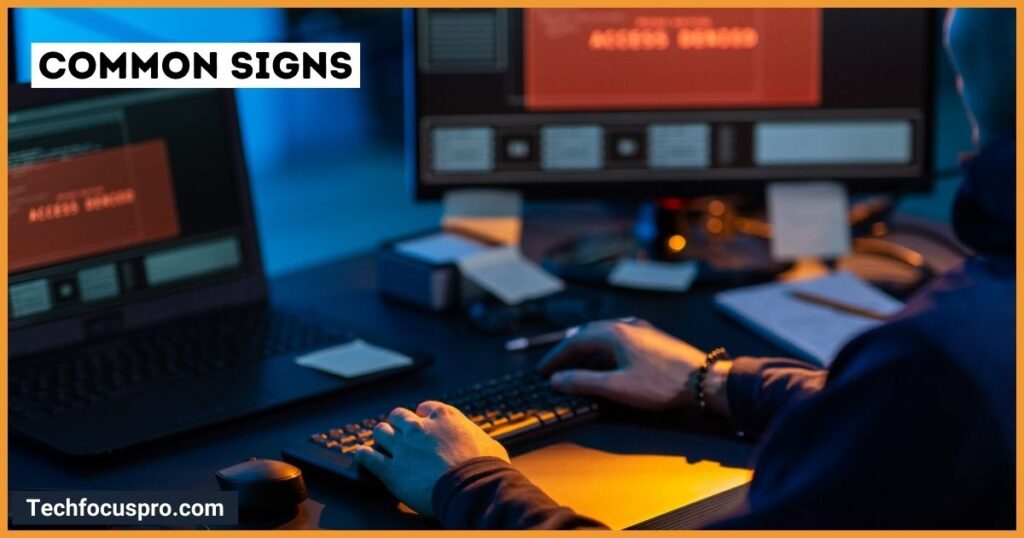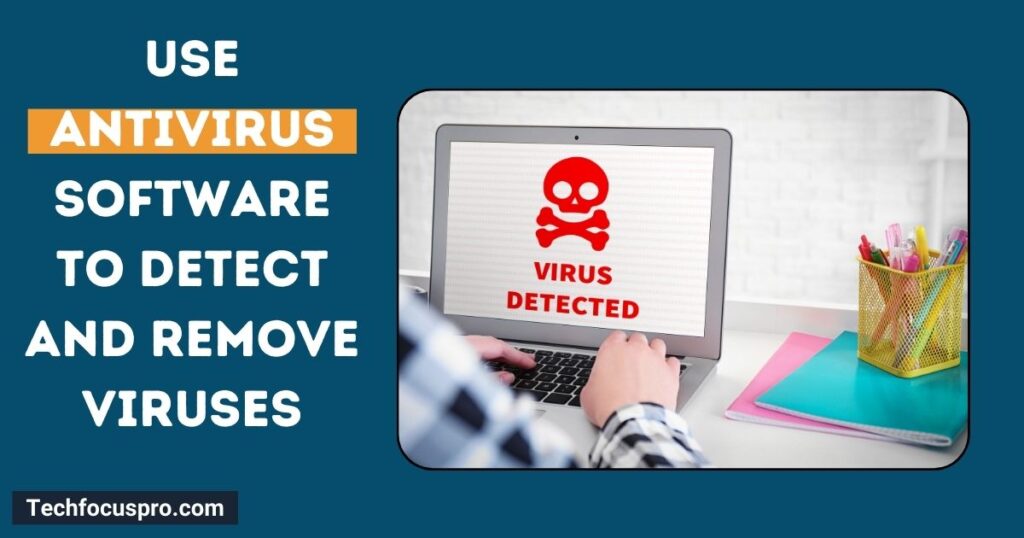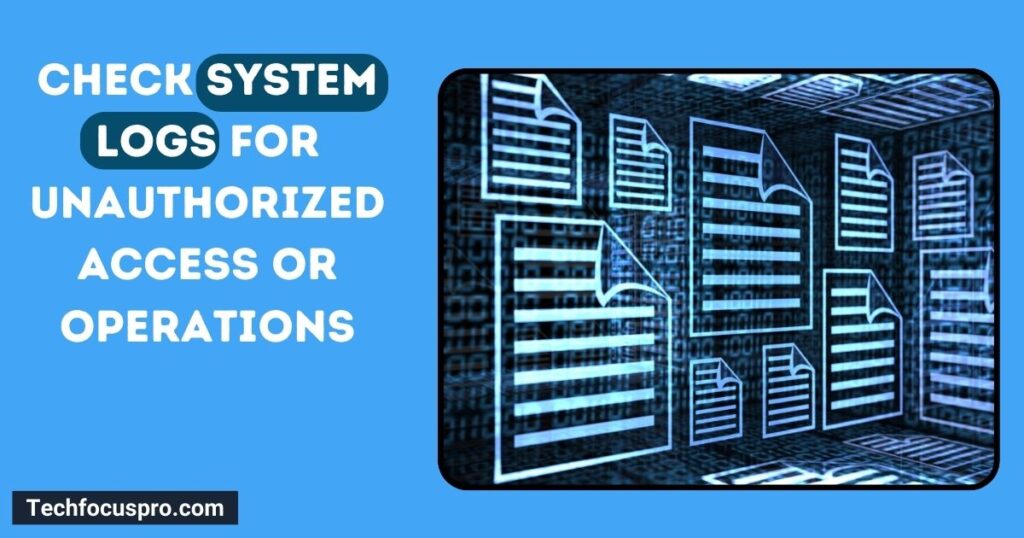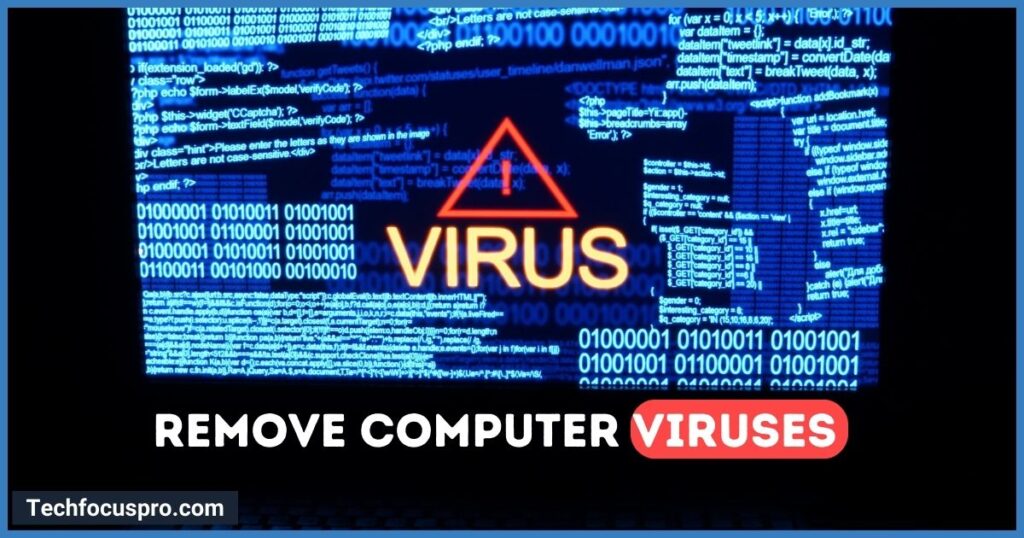
In today’s digital era, your computer serves as more than just a device; it acts as a portal to both your personal and professional life. However, similar to a bustling city, this gateway can also attract unwelcome visitors in the form of computer viruses. These virtual diseases can stealthily infiltrate your system, causing damage without warning. Whether you experience a sudden decrease in performance, encounter peculiar pop-up advertisements, or witness unpredictable behavior from your programs, the signs may be subtle yet concerning.
Understanding these signs is vital for the health and security of your digital life. In this guide, we’ll arm you with the knowledge to How to Tell if Your Computer Has a Virus, confirming you’re ready to take action and protect your cyber world.
The Importance of Cybersecurity

In today’s interconnected world, cybersecurity is no longer a choice but a crucial requirement. With the rapid increase in internet users, digital spaces have become prime targets for cybercriminals, instilling concerns not only among individuals but also within companies and governments.
A strong cybersecurity framework provides protection against unauthorized access, data breaches, and various cyber attacks that can result in significant financial losses, privacy invasions, and even compromise national security. On an individual level, cybersecurity ensures the integrity of personal information and defends against identity theft and phishing scams.
Relating to our main topic, “How to Tell if Your Computer Has a Virus,” understanding and applying vigorous cybersecurity measures are the first lines of defense in recognizing, preventing, and responding to malware penetrations. By staying informed about cybersecurity, users can identify the early signs of a computer virus and take practical steps to protect their digital footprint from malicious actors.
How to Tell if Your Computer Has a Virus – Common Signs

If you detect a computer virus early, it can prevent extensive harm to your files, privacy, and the overall performance of your machine. Here are 10 prevalent indications that might suggest your computer has been infected:
1. Slow Performance
If your computer suddenly starts operating at a slower pace without any apparent cause, it might indicate the presence of a virus silently operating in the background and utilizing crucial system resources.
2. Frequent Crashes or Reboots
If your system frequently crashes or unexpectedly reboots, it may indicate that malicious software is disrupting the regular operations of your system.
3. Pop-Up Ads
Adware, a type of virus, is often characterized by an onslaught of unexpected popup ads that try to deceive users into downloading harmful content, commonly disguised as virus warnings.
4. Disabled Security Software
Discovering that your antivirus software has been deactivated without your permission is a significant warning sign. Certain viruses possess the capability to render security software ineffective or circumvent it entirely in order to evade detection.
5. Unusual Hard Drive Activity
If you notice a continuous and vigorous drive activity, even when no programs are being executed, it could indicate the presence of a virus operating in the background.
6. Ransomware Messages
Receiving messages that your files have been encrypted and demanding a ransom for release is a clear sign of a ransomware infection.
7. Unfamiliar Programs on Startup
The presence of unfamiliar programs launching automatically upon computer startup may indicate the installation of unwanted software.
8. Unauthorized User Accounts
The identification of previously unknown, unauthorized user accounts within your system could indicate that a hacker has managed to infiltrate via a virus.
9. Changes to Home Page or Search Engine
If your web browser’s home page or default search engine is altered without your consent, it is probable that your browser has been infected by a hijacker virus.
10. Missing Files
The sudden disappearance or relocation of files, without any action on your part, could indicate the presence of a virus that is either operating or deleting your data.
Being aware of these signs and taking immediate action can prevent data loss, privacy breaches, and potential financial losses. If you observe any of these issues, it is crucial to perform a thorough system antivirus scan and, if necessary, seek assistance from professionals.
How can you detect a computer virus?
Steps to Verify Running a Full System Scan
To ensure efficient scanning of your system, follow these basic steps for directing a thorough system scan using reliable antivirus software. This is a crucial measure in identifying and eliminating potential viruses from your computer.
Using Antivirus Software to Detect and Remove Viruses

- Choose a Reputable Antivirus Program: If you haven’t already, select and install essential antivirus software. Consider options from well-known and appreciated cybersecurity firms.
- Update Your Antivirus Software: Before running the scan, ensure your antivirus software is updated to the latest version. This confirms it knows the newest viruses and malware.
- Run a Full System Scan: pick the ‘Full System Scan’ option within your antivirus program. This may take longer than a quick scan, but it widely checks your whole system—including files, programs, and system memory—for malware.
- Review the Results: After the scan is completed, review the results. The software lists noticed fears and suggests confinement, deletion, or repair for infected files.
- Take Recommended Actions: Follow the software’s approvals to deal with the detected threats. This may involve removing viruses or repairing corrupted files.
- Rescan if Necessary: If the infection is severe, consider running another full scan to confirm all threats have been removed.
Checking System Logs for Unauthorized Access or Operations

- Access System Logs: On utmost computers, you can view system logs over the operating system’s event viewer. For Windows, this is retrieved by searching for ‘Event Viewer.’ On Macs, look for ‘Console’ in the Values folder.
- Review Security Logs: Focus on security-related logs. Look for signs of illegal access or operations, such as failed login attempts, unpredicted software installations, or changes to system settings.
- Identify Suspicious Activity: Note any activity that happened without your knowledge or harmony. Repeated failed attempts to access specific files or services can be a red flag.
- Cross-Reference with Antivirus Findings: Compare your findings with the results of your antivirus scan. Similar events can help identify how a virus or malware might have arrived at your system.
- Take Preventative Measures: Based on your analysis, take steps to fortify your computer’s security, such as changing passwords, updating software, and regularly scanning for viruses.
By diligently following these steps, you will enhance your ability to identify and eliminate viruses from your computer, ensuring the security of your personal information and optimizing your system’s performance.
How to remove computer viruses?

Ensuring the security of your computer involves not only detecting and removing viruses but also preventing them from infecting your system in the first instance. Implementing robust prevention measures is crucial for minimizing the risk of virus infections. To enhance your computer’s security and protect your data, it is essential to follow these essential steps:
Regular Updates
One of the most effective ways to prevent virus infections is by regularly updating your software and operating systems. Software designers frequently release updates to address vulnerabilities and security gaps. Make sure to enable automatic updates for your operating system and any installed software, especially your web browser and security tools.
Safe Browsing Habits
Safe browsing habits prevent viruses and other malware from infiltrating your system. Avoid clicking on doubtful links, especially those in unwelcome emails or messages. Be careful when downloading files or apps from the internet, and avoid visiting websites that seem unlikely or are known for hosting malware.
Using Reputable Security Software
It is crucial to include reliable antivirus and anti-malware software in your computer security strategy. These programs provide ongoing protection against potential threats, detect and eliminate any existing infections, and ensure your system remains secure. Make sure to frequently update your security software and conduct routine full system scans to maintain a robust defense.
You can greatly reduce the risk of falling victim to viruses and other malware by taking these preventive measures. This ensures that your computer remains healthy and your data remains secure.
FAQs
How to remove a computer virus?
To remove a computer virus, you need to follow several steps. Begin by entering Safe Mode to prevent the virus from causing further harm. Then, eliminate a portion of the virus by deleting any temporary files. Utilize your antivirus software to conduct a thorough system scan, which will help identify and detach any malicious files. Follow the instructions provided by the software to remove the virus, which may involve deleting or isolating the infected files.
Can regularly restarting my computer help prevent viruses?
Restarting your computer can address various performance issues, however, it does not provide protection against viruses. To effectively prevent viruses, it is necessary to utilize updated antivirus software, practice safe browsing habits, and stay vigilant about detecting signs of infection.
How often should I update my antivirus software?
It is recommended that you enable automatic updates for your antivirus software. This ensures that it is constantly equipped with the most up-to-date virus definitions, enabling it to defend against emerging threats effectively.
Can a virus ultimately damage my computer’s hardware?
Although the primary purpose of viruses is usually to create software-related problems, such as stealing or corrupting data, it is important to note that some viruses can also cause hardware issues. For instance, a virus has the potential to overload the components of your computer, potentially resulting in overheating and physical harm.
Is using my computer for banking and shopping safe if I suspect it has a virus?
It is not safe to engage in any online financial dealings without confirming that your system is virus-free. In case your computer is infected, important information like passwords and credit card numbers may be hidden or compromised.
How can I tell if an antivirus alert is real or a scam?
Be wary of alerts that appear in your web browser, especially if they ask you to download software or provide personal information. Genuine antivirus alerts will always be displayed within the software’s application interface. These alerts are most likely scams.
Conclusion
To sum up, the initial step towards protecting your digital life is recognizing the indications of a computer virus. Clear indicators like sluggish system performance, frequent crashes, unfamiliar programs launching at startup, and unexpected popup ads indicate possible infections. By staying vigilant to these signs and taking prompt action, you can avoid the severe consequences that viruses bring upon your privacy and data integrity.
It is equally important to commit to maintaining vigilance and implementing comprehensive preventive measures. Make sure your software and operating systems are constantly updated, practice safe browsing practices, and invest in reliable security software. By incorporating these habits into your everyday digital routine, you strengthen your defenses against online threats. Keep in mind that staying alert and taking proactive measures are your greatest allies in keeping your computer free from viruses and running smoothly.
How to Tell if Your Computer Has a Virus – Techfocuspro Best Guide in 2024





